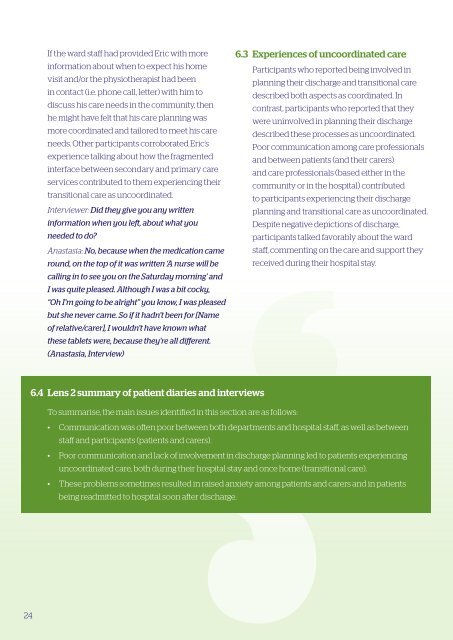Hospital Discharge
3Jzx309Yruj
3Jzx309Yruj
You also want an ePaper? Increase the reach of your titles
YUMPU automatically turns print PDFs into web optimized ePapers that Google loves.
If the ward staff had provided Eric with more<br />
information about when to expect his home<br />
visit and/or the physiotherapist had been<br />
in contact (i.e. phone call, letter) with him to<br />
discuss his care needs in the community, then<br />
he might have felt that his care planning was<br />
more coordinated and tailored to meet his care<br />
needs. Other participants corroborated Eric’s<br />
experience talking about how the fragmented<br />
interface between secondary and primary care<br />
services contributed to them experiencing their<br />
transitional care as uncoordinated.<br />
Interviewer: Did they give you any written<br />
information when you left, about what you<br />
needed to do?<br />
Anastasia: No, because when the medication came<br />
round, on the top of it was written ‘A nurse will be<br />
calling in to see you on the Saturday morning’ and<br />
I was quite pleased. Although I was a bit cocky,<br />
“Oh I’m going to be alright” you know, I was pleased<br />
but she never came. So if it hadn’t been for [Name<br />
of relative/carer], I wouldn’t have known what<br />
these tablets were, because they’re all different.<br />
(Anastasia, Interview)<br />
6.3 Experiences of uncoordinated care<br />
Participants who reported being involved in<br />
planning their discharge and transitional care<br />
described both aspects as coordinated. In<br />
contrast, participants who reported that they<br />
were uninvolved in planning their discharge<br />
described these processes as uncoordinated.<br />
Poor communication among care professionals<br />
and between patients (and their carers)<br />
and care professionals (based either in the<br />
community or in the hospital) contributed<br />
to participants experiencing their discharge<br />
planning and transitional care as uncoordinated.<br />
Despite negative depictions of discharge,<br />
participants talked favorably about the ward<br />
staff, commenting on the care and support they<br />
received during their hospital stay.<br />
6.4<br />
Lens 2 summary of patient diaries and interviews<br />
To summarise, the main issues identified in this section are as follows:<br />
• Communication was often poor between both departments and hospital staff, as well as between<br />
staff and participants (patients and carers).<br />
• Poor communication and lack of involvement in discharge planning led to patients experiencing<br />
uncoordinated care, both during their hospital stay and once home (transitional care).<br />
• These problems sometimes resulted in raised anxiety among patients and carers and in patients<br />
being readmitted to hospital soon after discharge.<br />
24


